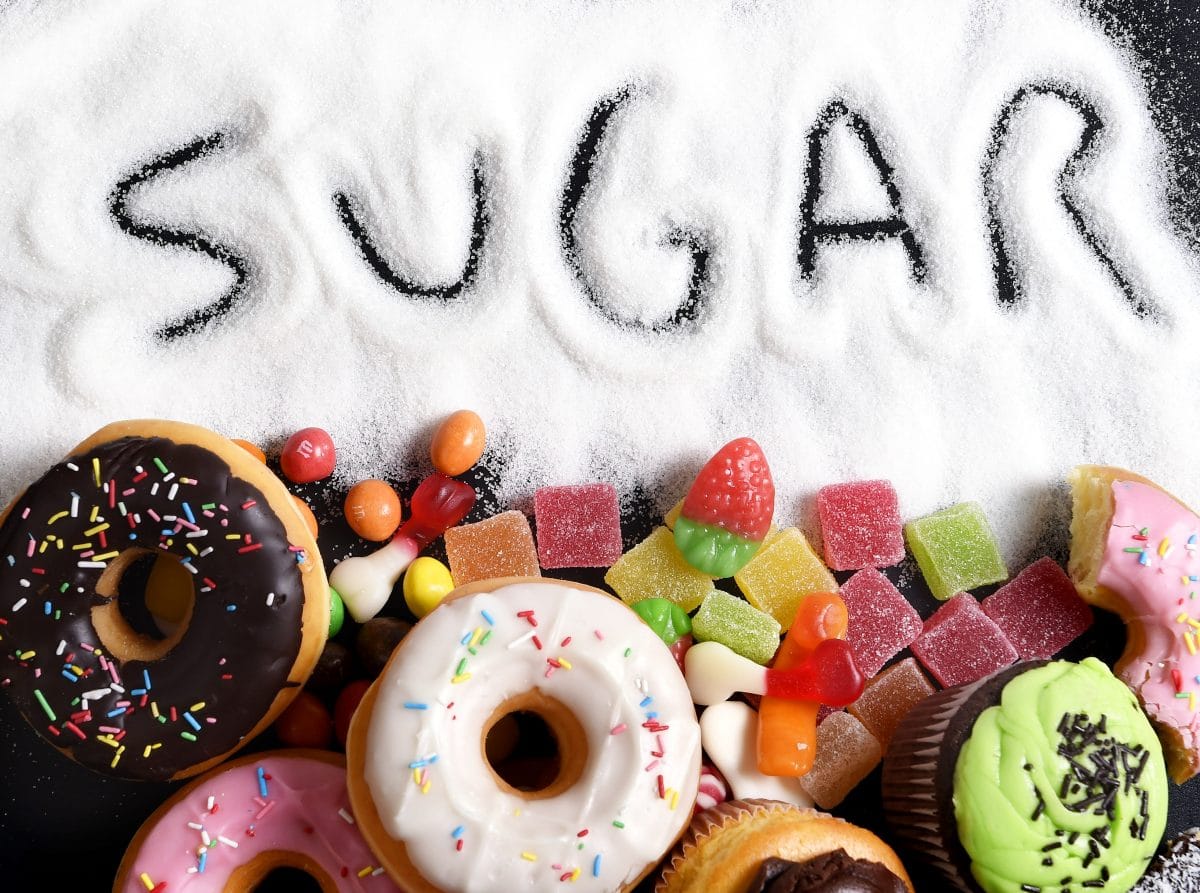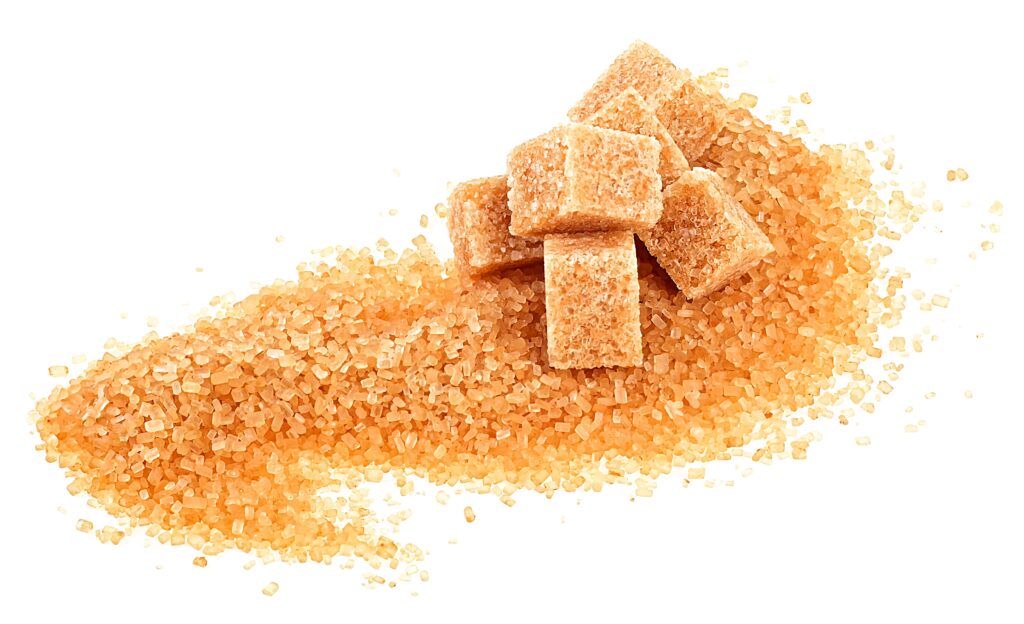Sugar and IBS
- Dietary Advice (non Low FODMAP)
You will likely have heard the claims around sugar being a trigger for IBS. You may have tried a sugar free diet to help your IBS symptoms.
The term ‘sugar’ refers to several different molecules. Not all ‘sugar’ will cause your IBS symptoms, only those which you are intolerant to.
In this article, I am going to explain how you should manage your sugar intake to avoid IBS symptoms.

Is Sugar Low FODMAP?
When you refer to sugar, you are probably thinking about the white stuff you add to tea. Or perhaps you are thinking about sugary foods like biscuits and cakes.
Most of this type of sugar does not cause IBS symptoms. This is because it is low FODMAP and is easily absorbed in your small bowel.
You do need to be careful with coconut sugar though. This is high FODMAP and may cause bloating and diarrhoea.
Low FODMAP Sugar
- Icing sugar
- Brown sugar
- White sugar
- Palm sugar
High FODMAP sugar
- Coconut sugar (contains fructans)
If you want more information on what foods contain FODMAPS, check out the low FODMAP Monash app.
Will My IBS Symptoms Improve on a Sugar Free Diet?
The answer to your question is yes. BUT it is not because of the sugar!
Typically, high sugar foods also contain many FODMAPs. For example, biscuits and cakes also contain fructans.
By avoiding foods which are high in sugar, you will be avoiding FODMAPs. So yes, your symptoms may improve but not because of the drop in sugar.
At present, there is not a single study showing that your IBS symptoms will improve on a sugar free or reduced sugar diet.
What Type of Sugar Will Cause Me IBS Symptoms?
If you have IBS, then your symptoms could be caused by the malabsorption of certain sugars.
These sugars are found inside foods and known as FODMAPs.
FODMAPs are fermentable carbohydrates which cause gas, bloating and diarrhea.
Lactose
Lactose is a type of FODMAP found in animal milks. If you do not produce enough of the lactase enzyme, then lactose may cause IBS symptoms.
You can read more about lactose intolerance and how to get a diagnosis in my other post here.
Fructose
Fructose is a FODMAP naturally found in foods such as honey, mango and orange juice. You may also find that it has been added to foods such as jams and sweet drinks.
If you have IBS, then fructose may cause symptoms such as bloating and diarrhoea. It is important to work out if this is a trigger for you and how much you can tolerate.
Sucrase-Isomaltase Deficiency
If you find that your IBS symptoms are worse with table sugar, then you may not have IBS at all. Instead, you could have a rare genetic condition call sucrase-isomaltase.
Foods that would cause you a trigger include;
- Honey
- Fruit
- Table sugar
- Barley malt
- Corn syrup
- Rice syrup
- Beer
Some breads - Cooked sweet potatoes
Breakfast cereals
This condition can cause bloating, diarrhoea, abdominal cramps and flatulence. So, as you can tell, it is easy to mis-diagnose this as IBS.
If you want to find out more about this condition and how to diagnose it, please read it my post ‘what is sucrase deficiency.’
Bacteria and Sugar
You may have seen that some online sources claim there to be a link between IBS and bacteria. However, they are getting mixed up with small intestinal bacterial overgrowth AKA SIBO.
SIBO is a common condition which produces similar symptoms to IBS. BUT it is a different condition.
If you want to find out more about SIBO, you can do so by reading my post here.
What is brown sugar?
Brown sugar is a common sweetener used in cooking and baking and boasts a distinct color and rich flavor.
These qualities are derived from brown sugar’s unique composition of sucrose mixed with molasses.
Molasses is naturally found in sugar cane and sugar beet plants. Around 10% of brown sugar is composed of molasses.
During the refining process, molasses is separated from the sugar crystals to create white sugar.
The molasses content in brown sugar provides the characteristics we all love such as moisture (creating a softer texture), a darker color and a deeper, caramel-like flavor.
Is Brown Sugar Low FODMAP?
Good news! Brown sugar is low in FODMAPs in 40g (or ¼ cup) servings and less (1).
White sugar and palm sugar are also low in FODMAPs When looking at other types of sugar, those highest in FODMAPs are demerara, coconut, honey and agave syrup – which are only low in FODMAPs in 4-7g servings (1).

Practical Tips for Using Brown Sugar in a Low FODMAP Diet
The amount of sugar in baking recipes can vary widely. A typical cake/brownie/cookie recipe can contain anywhere from ½ cup (~100g) – 1 ½ cups (~300g).
Given a low FODMAP serving of brown sugar is 40g, you should be able to use it in low FODMAP baking – just be cautious with serving sizes.
Low FODMAP Sugar Recipes and Ideas
You should check out some of the following recipes to see just how versatile sugar can be in all of your cooking and baking.
- Best low FODMAP maple brown sugar glazed ham
- Edible low FODMAP cookie dough
- Low FODMAP glazed carrots
- Low FODMAP toffee bark
- Low FODMAP maple oatmeal
- Low FODMAP brown sugar 5 spice cranberry sauce
- Low FODMAP kahlua, pecan and brown sugar baked brie
Summary
A low sugar diet may improve your IBS symptoms. This is because of the reduction in FODMAPs rather than the sugar itself.
There are some naturally occurring sugars which are FODMAPs and may need to be avoided to prevent IBS symptoms.
If you are suffering with IBS symptoms when you eat your regular white sugar, then you could be suffering with another condition.
SIGN UP TO MY FREE IBS WEBINAR – “How to gain symptom control without a restrictive diet”